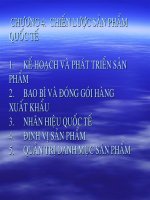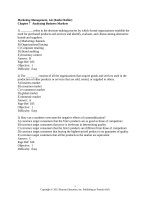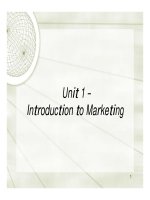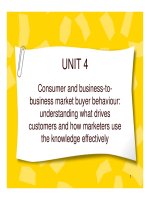Marketing quốc tế Slides BUSM2412 unit 7 s1 08 compatibility mode
Bạn đang xem bản rút gọn của tài liệu. Xem và tải ngay bản đầy đủ của tài liệu tại đây (1.99 MB, 44 trang )
Unit 7
Product,, Services and Branding
g
Strategy
1
Road Map: Previewing the
Concepts
Define product and the major classifications of products
and services.
Describe the roles of product and service branding,
packaging, labeling, and product support services.
Explain the decisions companies make when developing
product lines and mixes.
Identify the four characteristics that affect the marketing of
a service
service.
Discuss the additional marketing considerations for
services.
2
Wh
d t?
Whatt iis a P
Product?
A PRODUCT is anything that can be offered to a
market for attention, acquisition, use, or consumption
and that might satisfy a want or need.
Includes:
–
–
–
–
–
–
–
–
Physical Objects
S i
Services
Events
Persons
Places
Organisations
Ideas
Combinations of the above
3
Wh
i ?
Whatt iis a S
Service?
A SERVICE is a form of product that consist
of activities, benefits, or satisfactions offered
for sale that are essentially intangible and do
not result in the ownership of anything.
E
Examples
l iinclude:
l d
–
–
–
–
Banking
Hotels
Tax preparation
Home repair services
4
G d S
Goods,
Services,
i
and
dE
Experiences
i
Tangible Good
Pure
With
Tangible
g
Accompanying
Good
Services
Soap
Hybrid
Offer
Service
S
i
With
Accompanying
p y g
Minor Goods
Pure
Service
Auto With
Airline Trip
Accompanying Restaurant
With
Doctor’s
Repair
Accompanying Exam
Services
Snacks
5
Nature
atu e a
and
dC
Characteristic
a acte st c o
of a
Service
6
Illustrate how a movie theatre can deal
with the intangibility, inseparability,
y, and perishability
p
y of the
variability,
services it provides.
7
L
Levels
l off P
Product
d t
8
P d
Cl
ifi i
C
Product
Classifications:
Consumer
Convenience Products
Buy frequently & immediately
Shopping Products
Buy less frequently
Low
L
priced
i d
Mass advertising
Many purchase locations
i.e Candy, newspapers
Higher
Hi h price
i
Fewer purchase locations
Comparison shop
g, cars,, appliances
pp
i.e Clothing,
Specialty Products
Unsought Products
Special purchase efforts
New innovations
High price
Unique characteristics
Brand identification
Few purchase locations
i.e Lamborghini, Rolex
Products consumers don’t
want to think about
Require much advertising &
personal selling
i.e Life insurance, blood donation
9
What
these
at do you think
t
t ese
products are?
A pair of shoes
Toilet paper
KFC Chicken Burger
Mobile phone
Iced black coffee
Sofa
S k detector
Smoke
d
Gucci sunglasses
R fi
Refrigerator
t
10
Product Classifications: Industrial
Materials and Parts
Raw materials,, manufactured
materials, and parts
C it l Items
Capital
It
Industrial products that aid in
buyer’s production or operations
Supplies and Services
Operating supplies,
supplies repair/
maintenance items
11
Product
oduct Classifications:
C ass cat o s
Other Marketable Entities
Activities undertaken to create, maintain, or change the attitudes
g
and behaviour toward the following:
– Organisations - Profit (businesses) and non profit (schools and
churches).
– Persons – Politicians, entertainers, sports figures, doctors, and
lawyers.
– Places - Business sites, new residents, and tourism.
– Ideas (social ideas marketing) – Public health campaigns
campaigns,
environmental campaigns, and others such as family planning, or
human rights.
12
I di id l Product
Individual
P d t Decisions
D i i
13
P d t Attributes
Product
Att ib t
Developing a Product or Service Involves Defining
the Benefits that it Will Offer Such as:
Product Quality
Ability of a Product to Perform Its
Functions; Includes Level &
Consistency
Product Features
Differentiates the Product from
Competitors’ Products
Competitors
Product Style
& Design
Process of Designing a Product’s
St le & Usefulness
Style
Usef lness
14
Branding
What is a g
good brand?
15
B di
Branding
16
B di
Branding
Advantages to
Branding
g
– Buyers:
• Identification
• Quality
Q lit and
d value
l
– Sellers
• Tells a story
y
• Provides legal protection
• Helps segments
markets
Brand Equity
–
–
–
–
Higher
g
brand loyalty
y y
Name awareness
Perceived quality
Strong brand
associations
– Patents,
Patents trademarks,
trademarks
channel relationships
17
B
Brands
d and
d Brand
B
d Symbols
S b l
Powerful brands such
as these have brand
equity:
– Eg. Coca-Cola brand $69 billion
Offers defense
against
i t fi
fierce price
i
competition.
18
M j B
Major
Branding
di D
Decisions
i i
19
B
Benefits
fit off Branding
B di
Branding
distinguishes
products from
competition
Product
Identification
New Product
Sales
Repeat Sales
20
A Effective
An
Eff ti Brand
B d Name
N
Is easy to pronounce
Is easy to recognize and remember
Is short, distinctive, and unique
Describes the product
product, use
use, and
benefits
Has a positive connotation
Reinforces the product image
g yp
protectable
Is legally
21
M t Brands
Master
B d
Photocopy
Zerox
Mobile phone
Nokia
Internet Search
Computer
Car
Airline
Dell
BMW
Air Asia
Television
Sony
Fast food
McDonald
22
B di St
Branding
Strategies
t i
Brand
Manufacturer’s
B
Brand
d
Individual
Brand
Family
Brand
Combination
No Brand
Private Brand
Individual Family
Brand
Brand
Combination
23
B di St
Branding
Strategies
t i
24
Four Brand Strategies
Product Category
Existing
Brand
d Name
e
Existing
New
New
Line Extension
Vinamilk Yogurt
Yog t Flavours
Fla o s
Brand Extension
B bi Electronics
Barbie
El t i
Multibrands
M
ltib d
Toyota and Lexus
New Brands
25









